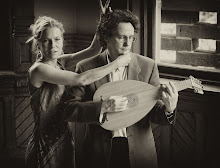Here's the program for the last concert in our Principal's Concert Series at St. Michael's College for the season, Ladies That are Most Rare with Justin Haynes, viola da gamba, and Katie Larson doing the pre-concert talk.
Charbonnel Lounge, University of St. Michael’s College, 81 St. Mary Street, 7:30 PM, Mar. 19th 2013.
 |
| Bernini's Apollo and Daphne. One verse of the first song thinks it's dreadful to be turned into a weather beaten tree for the sake of chastity, one thinks it's great to be forever green. |
Coy Daphne fled/Chast Daphne fled John Danyel (1564-c1626)
Eies looke no more Danyel
From depth of grief (Ps. 130) Anon.
Lyke as the Lute delights Danyel
Delacourt Pavan Anon.
Lachrimae Pavan John Dowland (1563-1626)
The Turtle Dove John Coprario (c. 1570-1626)
Go lovely Rose Henry Lawes (1595-1622)
Sweet stay awhile Lawes
 |
| Comus with his Revellers, by William Blake |
The Queenes Masque. the first Anon.
Sweet Eccho Lawes
Cuperaree or Grayes inn Coprario
The first of the Temple Robert Johnson (1583-c.1634)
Sabrina Lawes
Countrey Dance John Jenkins (1592-1678)
Country Dance Davis Mell (1604-62)
Now my taske Lawes
Hero’s Complaint to Leander Nicholas Lanier (1588-1666)
Oh mee the time has come to part Anon.
Program Notes
‘Into a most delicate and pleasant garden they came, lead by the King, who ther with true curiosities had Crowned himself in making that place the Crowne of all pleasure…Music ther was of all sorts… “Certainly,” sayd Amphilanthus, “voices resemble the heavenly music most, soe they bee rare and perfect voices.”
“Stronge voices you seeme to like the best,” sayd the King, “and such are heer (I can assure you) in all parfection, and Ladys that are most rare in that faculty.”’
- from Lady Mary Wroth’s Urania
John Danyel was the brother of the poet and playwright Samuel, who is the author of the lyrics ‘Lyke as the Lute’ and probably ‘Eies look no more.’ John Danyel’s Songs for the Lute, Viol and Voice of 1606 is dedicated to Mistress Anne Greene, the daughter of a wealthy if not particularly well-pedigreed knight, Sir William Greene. Danyel worked as a household musician for the Greene family. A few lines from his verse dedication will make clear the function of the songs in the collection. ‘To Mrs. Anne Grene… That which was onely privately composed,/For your delight, Faire Ornament of Worth,/Is here, come to bee publikely disclosed:/And to an universall view put forth.’ These songs, then, were written for Anne to enjoy, and probably sing in her lessons with Danyel.
Before he was engaged at court, Henry Lawes also worked as a household musician, for the more illustrious Egerton family. His duties included teaching the daughters of John Egerton, the Earl of Bridgewater, to sing. Lawes dedicated his Ayres and Dialogues of 1653 is to Alice and Mary Egerton, by then Countess of Carbery and Lady Herbert of Cherbury. The dedication says of the songs ‘most of them were composed when I was employed to attend to your Ladishipp’s education in musick’, that is, some 30 years earlier. Lady Alice performed and sang in Milton’s Comus, for which Lawes wrote the music, and in which he also sang. We perform some dances from other Stuart masques between the Comus songs, since the dances have not survived, and some contemporary ‘Country Dances’ called for in the text. Since ‘Sweet stay awhile’ precedes the Comus songs in Lawes’ autograph songbook, we can presume it was written when he was still teaching the girls.
Who would have sung Lanier’s Hero’s Complaint? We know that Lanier did himself, but the song is in soprano clef. Might Lady Mary Wroth (author of ‘Oh mee’) be depicting herself as one of the strong voiced ladies by having herself depicted with her theorbo, the accompanying instrument? (See front of the program.) There is much in her Urania that is autobiographical. Her aunt was Lady Mary Sidney (author of the Psalm), and the Lanier family, the Sidneys and the Herberts were bound up in complicated bonds of loves and patronage.


No comments:
Post a Comment